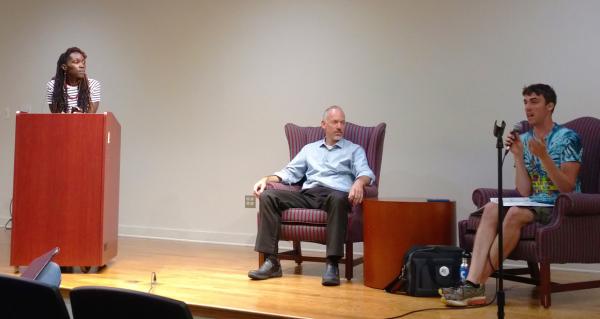Activists Continue Push for Athens Civil Rights Commission

Photo Credit: Chris Dowd
From left, Mokah Jasmine Johnson, Commissioner Kelly Girtz and Jesse Houle.
The Anti-Discrimination movement has been going strong in Athens since an MLK Day rally that saw almost 400 people march to City Hall in freezing temperatures. At the Athens-Clarke County Library Wednesday, they gathered again to work to ensure the ACC Commission passes a strong anti-discrimination ordinance.
Mokah Jasmine-Johnson facilitated the meeting, and began by explaining her perspective and her hopes for what this ordinance could become. In essence, she believes our local government has an obligation to fight discrimination throughout the county—not just downtown, and not just in bars.
As relayed by Athens for Everyone board member Jesse Houle, the anti-discrimination ordinance to this point has primarily been oriented towards the needs of UGA students. The UGA student government and the UGA NAACP compiled numerous stories of discrimination downtown, many citing unfair dress codes and use of “private” parties to screen out apparently unwelcome patrons. As one young black male in attendance mentioned, “I didn’t get the memo that you couldn’t go to different places [downtown].”
Mayor Nancy Denson has seemed willing to tackle these instances of discrimination in bars, but hesitated at widening the scope. The ordinance was pulled from the agenda this past month after some commissioners proposed additions.
How far can the ordinance be widened, and how much power does the local government actually have? Commissioner Kelly Girtz explained that threatening to revoke a liquor license is one of the few legal tools the local government has available in this situation. Even so, bars are not the only establishments who are granted liquor licenses—restaurants could also be included in the ordinance with only minor changes. This is the first of the Anti-Discrimination Movement’s requests.
Their second request is for an Athens Civil Rights Commission to be established by the local government, similar to ones already existing in Atlanta and Columbus. Johnson stressed that such a commission would be independent of the Anti-Discrimination Movement and that it would hear both sides of each complaint brought before it. She said the major role it would play would be as a liaison between the people of Athens and their government. It would be a place where those suffering from discrimination can go to air their complaints and get assistance on how to proceed effectively. In turn, the ACRC would report periodically to the Mayor and Commission about their findings, and could make recommendations.
Girtz seemed to agree with the overall concept behind the ACRC, saying, “It is absolutely reasonable that we have an ongoing body to be asking these questions.”
Commissioner Melissa Link concurred, saying, “We have a duty to acknowledge incidents of discrimination and do whatever we can to help change our culture.”
After a wide-ranging discussion about the ordinance and ACRC, some members of the audience came forward to tell their stories. Some involved discrimination and even blatant racial slurs by private businesses, whereas others involved police encounters.
“I’ve been pulled over three times in the past month and a half,” said Broderick Flanigan, a local business owner and artist. “Only one time was I given a citation.”
Towards the end of the meeting, everyone seemed eager to know what they could do to help the passage of a strong anti-discrimination ordinance. Johnson urged first that everyone sign the petition asking for a Civil Rights Commission, and also to contact their commissioners with the same request. In addition, supporters can attend the next mayor and commission meetings on Sept. 20 and Oct. 4. Personal stories of discrimination can be sent to Johnson at [email protected]. There is also an open letter that organizations and businesses can sign their support for the movement.












comments